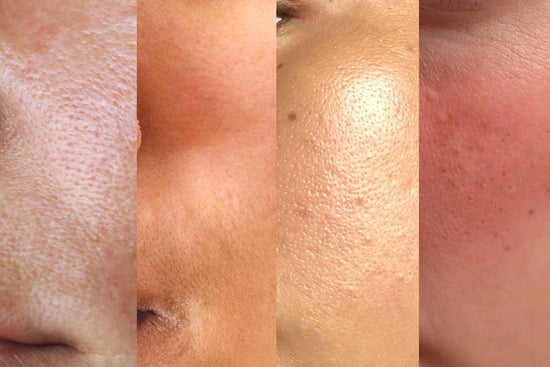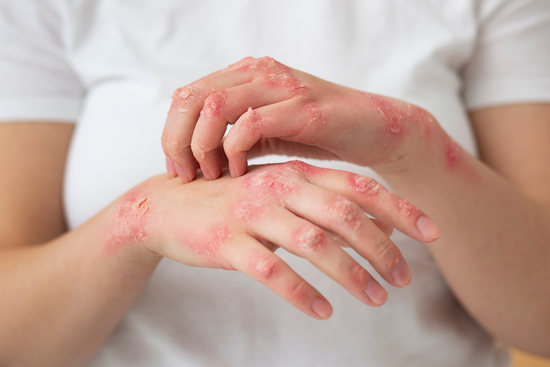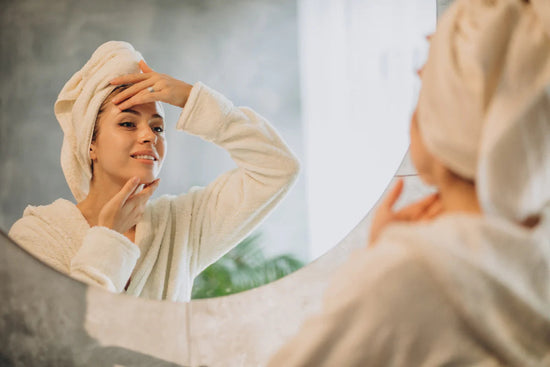Rosacea is a skin condition that produces facial redness, affecting millions worldwide. Rosacea symptoms are most commonly found on the nose, cheeks, and forehead. This article aims to shed light on the causes, symptoms, and effective management techniques for rosacea, providing valuable insights to empower those dealing with this condition and offering a clearer path toward living comfortably despite its challenges.
What exactly is Rosacea?
Rosacea is a long-term skin disease that mostly affects the face, resulting in pustules, visible blood vessels, redness, and acne. It usually affects adults with fair complexion and varies in severity. Sunlight, hot foods, alcohol, and stress are some typical triggers. Although rosacea cannot be cured, it can be controlled with medication, a change in lifestyle, and a reduction in triggers.
Types of Rosacea
Erythematotelangiectatic: Rosacea is a chronic condition that results in facial redness and swollen, noticeable blood vessels (vascular). This form of flare occurs when symptoms appear and disappear unexpectedly.
Papulopustular: Pimples that appear on your skin and are filled with pus or liquid. Your skin may swell, and the symptoms may be similar to acne.
Phymatous: Swelling and thickness of the skin are caused by symptoms. Your skin may be rough, which is especially noticeable on the bridge of your nose. Because of the symptoms, your nose may appear bulbous (rhinophyma).
Ocular: Rosacea can make your eyes feel watery or bloodshot and irritating. Your eyes are light sensitive, and painful pimples on your eyelids can form.
Causes of Rosacea
Some of the things that frequently cause rosacea are:
- Sunlight
- High or low temperatures
- Wind
- Stress
- Baths in hot water
- Foods and beverages that are hot or spicy
- Alcohol
- Exercising at an intense pace
The precise cause of rosacea is yet to be fully understood, but it's believed to be a combination of genetic, environmental, vascular, and inflammatory factors.
Management of Rosacea
It may not always be feasible to completely avoid rosacea, especially if you have a genetic susceptibility to the condition. There are, however, steps you can do to lower your chances of having rosacea or to alleviate its symptoms if you already have it:
Protect Your Skin from the Sun: Sunlight is a common cause of rosacea. When going outside, use sunscreen with an SPF of at least 30, and wear wide-brimmed hats and sunglasses. When the heat is at its hottest, seek shade.
Use Gentle Skincare Products: Harsh cleansers, scrubs, and products containing alcohol or scents should be avoided since they can irritate the skin. Make use of gentle, hypoallergenic skincare products.
Avoid Triggers: Recognize and avoid particular causes that aggravate your rosacea symptoms. Spicy foods, hot beverages, alcohol, and stress are all common causes. Keeping a diary can help you figure out what causes your flare-ups.
Manage Stress: Rosacea symptoms might be exacerbated by stress. To help manage stress, use stress-reduction strategies such as meditation, deep breathing, yoga, or mindfulness.
Limit Hot Baths and Showers: Hot water can cause blood vessels to widen and increase redness. Use lukewarm water to bathe and shower.
Choose the Right Cosmetics: Mineral-based makeup is usually less irritating for those with rosacea. Look for cosmetics labeled as "hypoallergenic" or "non-comedogenic."
Dietary Modifications: While there is no one-size-fits-all rosacea diet, some people find that limiting trigger foods including spicy foods, hot beverages, and alcohol can help. Keeping a meal journal might help you identify personal triggers.
Skincare Products to Consider
-
Non-irritating cleansers - Look for cleaners that are gentle, odorless, and non-abrasive. Steer clear of harsh components that can cause irritation, such as menthol, alcohol, and perfumes.
Hypoallergenic Moisturizers - Opt for fragrance-free, hypoallergenic moisturizers that provide hydration without clogging pores. Also, look for products that contain hyaluronic acid, or niacinamide, which help repair and strengthen the skin barrier.
-
Sunscreens - Sensitive skin types typically tolerate physical sunscreens with titanium dioxide or zinc oxide well. These protect against irritation-causing substances while providing broad-spectrum coverage.
Makeup - Products like mineral makeup can be kind to delicate skin. Seek out non-comedogenic and fragrance-free concealers and foundations. For those with rosacea-prone skin, brands like BareMinerals and Jane Iredale provide mineral makeup choices.
Wrapping Up
Understanding rosacea, its triggers, and effective management strategies is crucial for individuals affected by this skin condition. It's essential to seek advice from a healthcare professional or dermatologist to develop a personalized treatment plan that suits individual needs and minimizes its impact on daily life.




